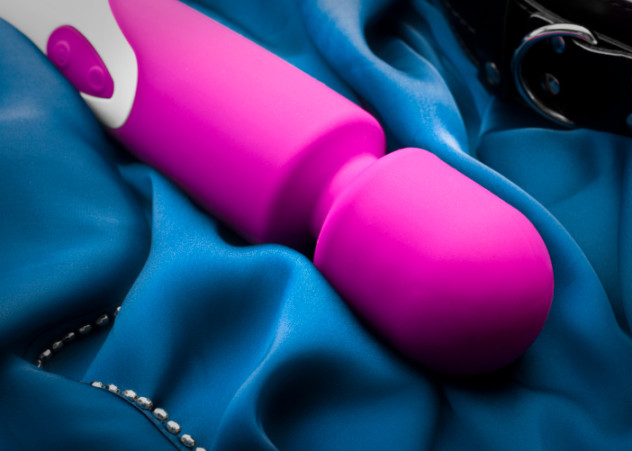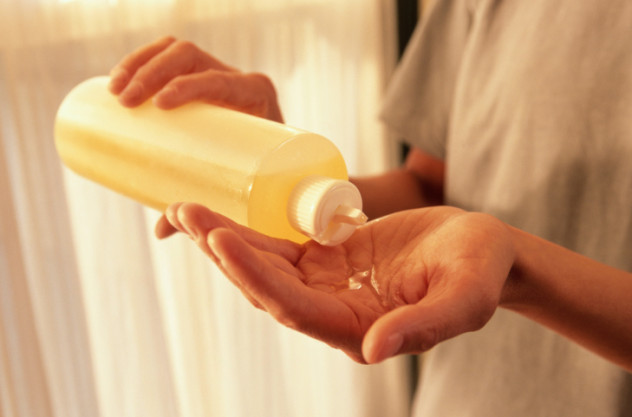10 Vibrator Bars
In the Shibuya district of Tokyo is The Vibe Bar Wild One, which has quite a philosophy: “See, touch, and feel.” For 3,000 yen, women and couples can sample some of the over 300 domestic and imported vibrators displayed on the wall behind the bar for up to 90 minutes while they sip their drinks. With close access to the Shibuya metro station, the bar even features English-speaking staff to cater to curious tourists. Nearby is the bar Love Joule, called the first “sex and love bar dedicated to women.” It is said to be a safe space for women to openly discuss masturbation and their sexual lives. According to proprietor Megumi Nakagawa, “Once they take a seat, customers are able to experience a pleasant place in which they can openly discuss masturbation. Since most people view female masturbation as something of a mystery or taboo, it is not a usual topic at typical bars.” As might be expected, entry is barred to single men. Men can only enter accompanied by women. This is to help create a safe space to discuss sex and masturbation, traditionally taboo topics for women in the country. The bar has already become popular for ordinary women and those working in the pornography and adult film industries, such as former adult video star Nayuka Mine and model Sayo Hayakawa.
9 Orgasm Wars
This highly scripted but oddly hilarious piece of television decadence features a gay man attempting to make a straight porn star ejaculate every episode. The most famous contestant on the program was a bar owner named Takuya, an average guy with “the charisma of a leading lady.” His startling performance gained fans in Japan, Taiwan, and Hong Kong. The show featured this memorable exchange between the confident Takuya and his straight male porn star opponent: TAKUYA: “I will definitely make you come!” SAWAI: “I am definitely not going to come!” TAKUYA: “I will definitely . . . swallow.” Unfortunately for professional adult film star Sawai, Takuya’s technique proved irresistible. Before the battle commenced, Takuya inspected the target and confidently intoned, “This shape of c—k is the shape that I can make come.” Through mysterious techniques called “High Speed Vacuum” and “Throat Hold,” Sawai was defeated with 10 minutes left on the clock. Analysts believe Japanese game shows like Orgasm Wars reveal much about Japanese culture. According to ABC’s Arthur Smith, the producer of I Survived a Japanese Game Show, “Their games are all about saving face. When you don’t do good, you’ve harmed your family—you don’t look good in your family’s eyes.”
8 Sex Propaganda
Despite the thriving domestic market for the sex industry, Japanese media has a real problem with Chinese sex tourists. In 2013, the Shukan Post ran the headline “Wealthy Chinese paramours get to do anything they want in Japanese sex shops.” The article detailed the exploitation and denigration of Japanese sex workers by Chinese sex tourists. Wealthy businessmen from China apparently eat sushi off the naked bodies of Japanese women, bring in laptops and ask them to reenact favorite porn scenes, have absolutely no manners, and take photographs despite “No Camera” signs. The furor was noted and dismissed in China. Hong Kong’s South China Morning Post wrote, “Reports about the supposed sexual habits of Chinese tourists and the problems they are causing in Japan’s red-light districts have been dismissed as simply another way for the tabloids to belittle the Chinese.” However, the sex industry has been exploited in both countries as a way to stir up nationalist resentment. In 2010, an orgy for 400 Japanese businessmen reportedly took place in the city of Zhuhai, which led to arrests and massive public outcry. The Foreign Ministry in Beijing expressed indignation at the incident, which suspiciously happened on the anniversary of Japan’s invasion of northeastern China in 1931. Zhuhai had previously tolerated the sex trade as a useful boost in the local economy with an attitude described as “one eye open, one eye closed.” Whatever you think about the ethics of the sex industry, there is some pretty obvious hypocrisy on both sides, allowing for the existence of a thriving sex trade while occasionally using it to drum up nationalism and xenophobia when political conflicts occur.
7 Super Free
Super Free is social club at Waseda University known for its wild parties. In the mid-1990s the organization developed a toxic power structure that turned it into a rape club. It was led by Shinichiro Wada, who had transferred from a less prestigious university and spent 10 years floating around in its politics and economics department until he was expelled for failure to pay tuition fees and forced to reenroll in its second division school. His scholastic underachievement was due to his concentration on running the Super Free social club. Watch this video on YouTube They developed a pyramid structure for party promotion. Members were divided into “first string,” “reserves,” or “boys” depending on their position in the hierarchy. The tickets for massive parties cost 4,000 yen for men and 3,000 yen for women. After the main event, there would be a second round for drinking. The men who joined expected sex, believing that women who participated in the parties merely wanted to get laid. They would target women from less prestigious universities, inviting them to events, getting them overly drunk, and then subjecting them to gang rape. Wada later described the tactics to police: “We deliberately made an unsuspecting girl dead drunk. The one who managed to lure the girl out of the pub had the first option [to rape her].” Drinks were spiked, and photos were taken of the intoxicated women as they were gang raped, which the club threatened to publish if they women reported them. After some women came forward following a gang rape in the Roppongi district, many members of the Super Free inner circle were arrested and convicted. At least 30 women later came forward to report members of the group. Seiichi Ota, a senior Liberal Democratic Party member, shocked the public by defending the rapists: “Gang rape shows the people who do it are still virile, and that is OK. I think that might make them close to normal.” The aftermath of the scandal and Ota’s comments highlighted the ingrained culture of drinking and sexual violence in Japan.
6 Masanobu Sato
An employee of the Japanese sex toy manufacturer Tenga, Masanobu Sato has a hobby that fits with his career and has also made him famous. He is considered a world champion in masturbation. He has competed at the San Franscisco Masturbate-a-thon, where he gave tips and techniques to the crowd at the event. He is a world champion at long-distance masturbation, the object of which is to stay aroused without ejaculating for as long as possible. Watch this video on YouTube Interestingly, Sato has a reasonably normal life around his unorthodox hobby. He has a live-in girlfriend and a daily routine of “training.” The girlfriend is quite unfazed by her boyfriend’s activities, saying, “He puts a lot of effort in it, and I just have my own hobbies.” Sato claims they only have sex a few times a year due to his girlfriend’s disinterest, but they are otherwise happy together. In a 2009 article with Vice, Sato gave the reasons for his success. He has an extremely active imagination and an active routine of swimming, which gave him his remarkable endurance. He also gave credit to the products of his employer and the variety of sensations they produce. But finally, he said that “some of my natural body traits were something special. I really need to thank my parents for transferring to me good DNA.”
5 Tamatoys Scented Oils
Operating out of the notorious geek district of Akihabara, Japanese adult goods company Tamatoys produces a range of erotic scented oils advertised with the tagline, “The forbidden scents—experience that smell one more time.” Classic flavors include “Girl Armpit,” “Working Women Stocking,” and (of course) “Schoolgirl’s Urine.” Most of these have been available since 2002. In 2012, the company decided to up the ante on unsettling depravity, releasing “The Smell of a Boy’s Anus” oil. A Tamatoys spokesperson was quote as saying, “This product does not smell like s—t. It is purely the smell of anus.” Describing the scent, they say, “It has a strong musky perfume smell, tinged with a pungent odor.” The same year, they released a line of scented panties called that are supposed to smell like “little sister.” They are available in pink (“sweet aroma that brings to mind a bratty yet affectionate little sister”), blue (“cute aroma of a nurturing little sister who always looks after her big brother”) and green (“fresh aroma of an energetic little sister”). Online retailer HotPower describes their use: “You can put them on your head, you can wear them yourself, you can put them on something else; enjoy them however you want—within legal boundaries!” It’s always a worry when a company has to add such a disclaimer to its ad copy. The Tamatoys Research and Development department is apparently still hard at work. According to Taiwanese reports, the company brought out a number of new perfume products, including “Female Students’ Periods,” “Transexual’s Ass,” and “Female Student’s Squirt.”
4 Naked Continent
In 2006, producer Sakkun was in Kenya when he was reportedly struck by the poverty of the children there and thought, “Isn’t there anything an AV director can do to help?” So, after giving one million yen ($11,000) to the Kenyan aid company Musona Self Help Group, they sent a Japanese porn actress to the country to film a “charity porn.” For each DVD sale, the company also planned to give an additional $10 to the charity. The film was described like this: “A generous girl, Nana, went to Africa to help people there. While she worked as a volunteer member during the day, she was still a horny bitch who got hotter and wanted to get f—d at night . . . heartwarming yet erotic!” The film received heavy criticism in Western media for its exploitation of poor people as well as the Japanese actresses, the perpetuation of negative stereotypes about Africans, the risk of HIV infection due to shooting scenes without condoms, and the relatively paltry amount given to the charity in the making of the film. Sakkun apparently wasn’t paying much attention—he was more concerned with the fact the Japanese censors forced him to add mosaics to the faces of children portrayed in the film (though not during any of the sex scenes, we should add). “It’s sad not to see their smiling faces,” said the producer.
3 Enjo Kosai
Enjo kosai, which translates to “compensated dating,” usually involves young women, including schoolgirls, dating older men for monetary reward. This may but does not always include sexual encounters. The practice emerged at the end of the Japanese economic boom in the 1980s as middle-class girls used to being pampered by their fathers suddenly found that their lifestyle was no longer sustainable. Many turned to compensated dating because they were discouraged from finding employment. Initially, contact between middle-aged men and schoolgirls went through “telephone clubs,” in which the men would pay for a girl’s mobile phone number. Later, the Internet made it possible for the men to simply advertise what they wanted and how much they were willing to pay on message boards and connect with girls anonymously to negotiate. Much of this spawned from the Japanese fetish for kogals, young Japanese women in school uniforms, loose socks, and heavy make-up. In the mid-1990s, there was a media frenzy over the practice, but most of the heavy criticism was directed against the girls rather than the men. The general attitude was that the girls were “selling their innocence.” A 1999 law made it illegal to “engage in paid sexual intercourse with a child under the age of 18.” The age of consent in Japan is an alarming 14 years old. Police moved against the practice by focusing on the youths themselves rather than adult offenders. Officers posed as potential customers in online stings. In 2014, 284 youths offering enjo kosai services were arrested by police. However, this was out of a pool of 11,051 cases in which undercover police sent replies, but appointments were not made or the girls didn’t show up. This may suggest the high school girls are savvy about recognizing police online, and the issue may involve vastly larger numbers as well.
2 Fetish Clubs
Perhaps due to its generally homogenous and conservative society, Tokyo has one of the wildest and craziest fetish scenes on the planet. The city caters to hundreds of fantasies, from more well-known interests like bukkake, kikkou (bondage), and nyotaimori (eating sushi from a naked woman) to more unusual and problematic tastes such as unagi (inserting eels) and ha daisuki (dental exam), wherein fully clothed women are given a dental exam while (presumably) men watch with avid interest. The first journalist to expose the world of Japan’s exotic fetish clubs was Joan Sinclair, a photojournalist from San Francisco. While teaching in Tokyo in 1995, she learned of “image clubs” where women dressed as nurses, policewomen, and secretaries to provide fantasy services to paying customers. Returning to Japan in 2005, Sinclair spent a year gaining the trust of the workers, managers, and customers of the image clubs in order to gain firsthand access to the world of paid fantasy, as known as fuzoku culture. She ended up gaining access to over 90 different “playrooms” that were elaborately designed to mimic classrooms, offices, train carriages, and even sexual harassment meeting rooms. According to Sinclair, this isn’t underground culture but mainstream culture. Businessmen often bring clients to such clubs to entertain them. They exist in a legal gray zone but are generally allowed to operate if they maintain a level of cleanliness and order. The clubs are all but inaccessible to foreigners, who are understood to not know the rules, disturb Japanese customers, complain, be difficult to communicate with, and possibly have AIDS. Sinclair found it difficult to gain access as a foreign woman but got an in through the editor of Tokyo Soapland magazine, for whom she took photographs of various “soaplands” with themes like traditional, wedding, policewoman, harem, and “Korean woman.” She even wrote a column for the magazine entitled “Through Her Blue Eyes.”
1 Kiss Transmission And Sex Robots
Japan boasts some of the most technologically sophisticated sex dolls in the world. These so-called “dutch wives” are made from the highest-quality silicone material with extremely lifelike eyes and skin. Many are customizable and fully jointed. According to Orient Industry spokesman Osami Seto, “The two areas we identified as really needing improvement were the skin and the eyes. We feel we have finally got something that is arguably not distinguishable from the real thing. The dolls are part of a high-tech industry in Japan, which is constantly looking at ways to make sex toys as realistic as possible.” What happens when the sophisticated Japanese sex doll industry combines with the equally sophisticated Japanese robotics industry? The first sex robots were developed by New Jersey company TrueCompanion back in the 1990s, but the Japanese are likely to catch up fast. In 2014, disposable male sex toy manufacturer Tenga unveiled a device that combines robotics with virtual reality to simulate sex with an animated woman. Vice‘s Brian Merchant wasn’t too impressed: “The creepiest thing about all of this wasn’t even the robot handjob, but the melancholic submissiveness of the avatar they’d rendered. I felt empathy with the character, but not the kind I was probably intended to.” Tenga CEO Tsuneki Sato was more bullish, calling it “the future of masturbation.” Not all the technology to digitize sex necessarily involves only one human participant. In 2011, inventors at Tokyo’s Kajimoto Laboratory developed the Kiss Transmission Device, which allows people to French kiss over the Internet. You hold a plastic straw attached to a rectangular device to simulate kissing, which is then transmitted to another participant with the same device. It is even possible to record kisses for future enjoyment. Researcher Nobuhiro Takahashi believes the device could be useful for long-distance couples as well as fans of certain celebrities, who could sell make-out sessions through the device. According to Takahasi, “If you have a popular entertainer use this device and record it, that could be hugely popular if you offer it to fans. [However,] the elements of a [real] kiss include the sense of taste, the manner of breathing and the moistness of the tongue. If we can recreate all of those, I think it will be a really powerful device. David Tormsen’s sample of a proposed perfume line “Scent of a Listverse Author on his Third Red Bull” has received no response from Tamatoys. For samples, email [email protected].
























